My friends, my friends! If you have been embroidering for even a little while, you’ve probably encountered metallic threads.
And if you’ve encountered metallic threads, you’ve probably encountered the Unending Frustration that goes with them!
For hand embroidery, metallics are always problematic, it seems – more so when you’re doing surface embroidery, free of a grid with open holes like those provided by needlepoint canvas or counted cross stitch fabric. When you’re embroidering on a fabric with a closely-woven surface, like a high count linen, cotton, or silk, metallics are not friendly.
In fact, they’re normally pretty darned cranky.
Today, I’m going to show you metallic threads you will actually want to use, whether you’re doing surface embroidery, counted work, or needlepoint!
These metallics are well-behaved, compared to other metallics widely available on the needlework market. In fact, they are actually a pleasure to stitch with. And when you’re talking about a metallic thread, that says a lot!
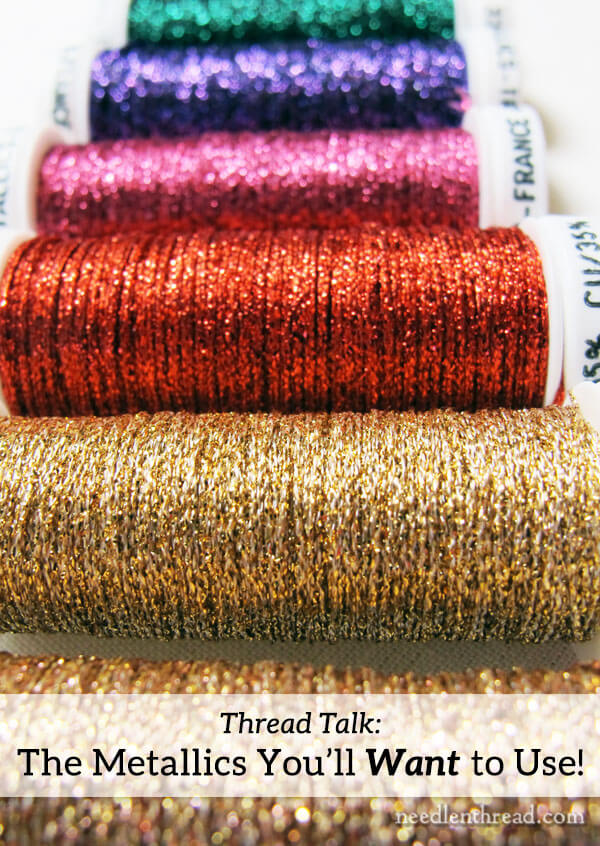
A long time ago, back in the early days of my adulthood, when I was barely no longer a youth, I began exploring “goldwork” – only I had no idea where to find goldwork threads (this was pre-internet), so I used metallic threads.
In fact, there was only one metallic thread available to me at the time. It was not a very happy experience!
It surprises me even now, when I look back, that it didn’t put me off embroidery forever.
But it did put me off metallics for a long while, and I’ve had a hard time getting over that. Still, if you like sparklies (I do!), and if you are enamored with threads in general (I am!), it doesn’t take long to start glancing at metallics again, even if you’ve been burned by them once or twice. There’s always the hope that something will have changed.
Are All Metallics Equal?
And though the thread industry has come a long way with all kinds of new threads and wonders on the market, I still find the metallics commonly available troublesome, irritating, and frustrating in some way or another. I’ve not found one widely available metallic thread that I really love – that I find pleasurable to stitch with – but there are a few that I’ve tolerated when I’ve wanted the effect of metallics in a design.
And that’s The Thing about metallics. It seems, with many stitchers (and even some designers), that we freely admit frustration when working with metallic threads. We adopt all kinds of little hints and tips to try to achieve a successful result, and we soldier through, hoping for success, because we want the outcome.
Use Thread Heaven! (a silicone-based thread conditioner).
Use a laying tool!
Cut short lengths!
Cut very short lengths!
Use a Really Big Needle.
Iron it! (Or run it through a flat iron.)
This is just some of the advice we’re given when working with metallics, because, after all, isn’t that just the nature of the thread?
Aren’t all metallics made equal, equally frustrating in one way or another? Isn’t the frustration something we just have to put up with?
And so we employ any extra effort necessary, to help reduce that frustration.
On that grounds, you can guess how it is: some stitchers forego the sparkle completely, because, really, who needs the frustration?! Embroidery, after all, shouldn’t be about frustration!
THAT Metallic Braid
Several years ago, I tried a metallic braid – a rather hefty one, as embroidery threads go – that changed my view on metallics.
That’s when I discovered that all metallics are not equal.
The spool was marked as Au Ver a Soie, and the braid was a size 16. I used it to play around with some braid stitches.
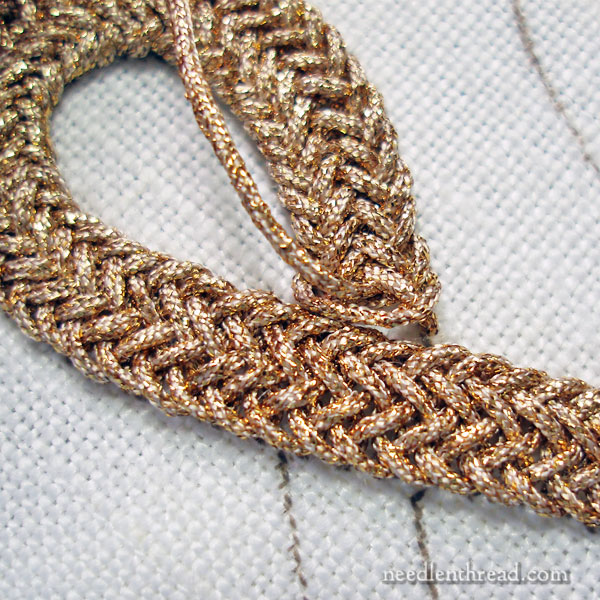
Specifically, I tried it with plaited braid stitch…
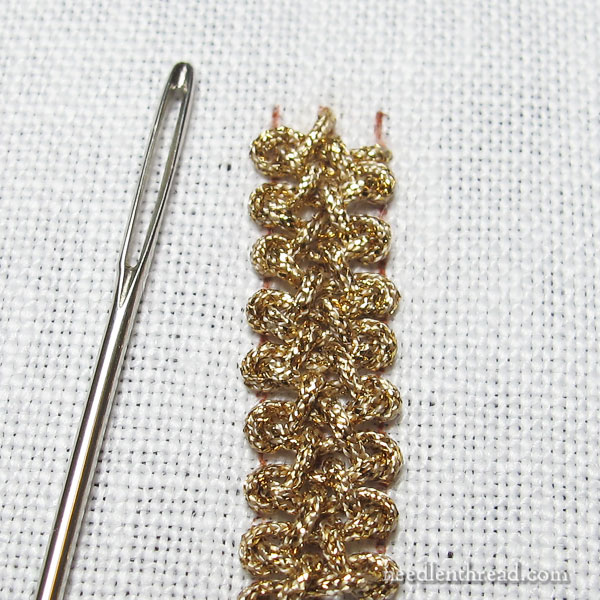
…and with Spanish knotted feather stitch, worked close.
It worked well!
In fact, it worked magnificently!
In fact, it was a pleasure to stitch with!
Unlike other metallics, when this thread passed through the fabric, the metallic fibers didn’t break, causing the thread to knot or bunch, even after repeated stitching.
The thread didn’t twist – it was very supple. It did just want I wanted it to do, and behaved just as a good thread should.
But it wasn’t available on the US market, and I had no desire to design anything with metallics, so I didn’t really think about it again…much.
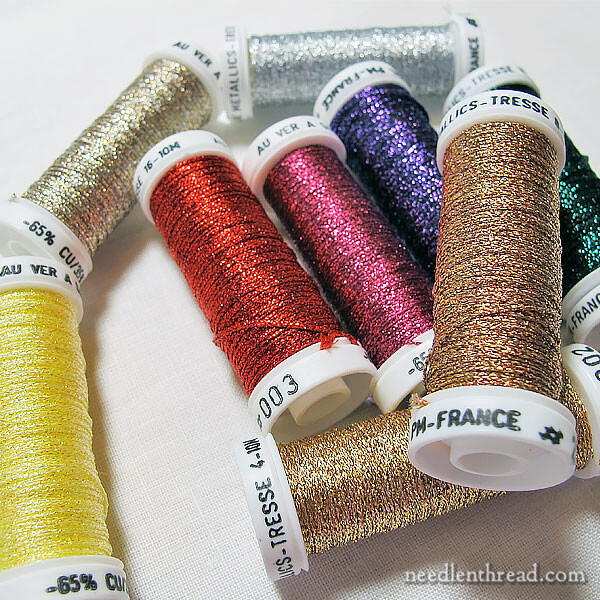
Recently, though, I’ve been thinking about incorporating metallics on a project that I’m concocting, that requires a little zing to make it work the way I want it to.
Remembering my success and pleasure with the Au Ver a Soie #16 braid, I reached out to Au Ver a Soie to find out more about their braids.
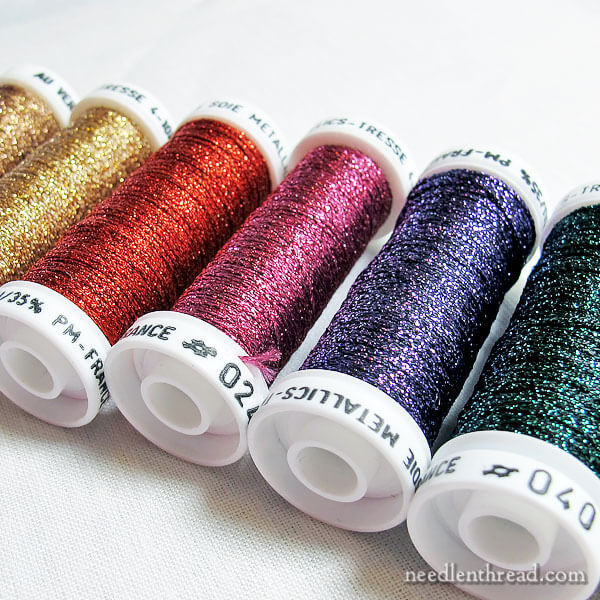
Au Ver a Soie is a silk thread company in France that’s best known here for their gorgeous line of high quality silks for hand (and machine) embroidery. And – wow! – to my surprise, they also produces a fairly vast line of metallic threads. Did you know that? I knew they had the one braid, but I didn’t realize they had a Whole Line of metallic threads in various sizes, in some 150 (one hundred and fifty!) colors.
But now I do!
I’ve tried three of the weights (thicknesses) of the metallic braid – 4, 8, and 16.
I’m convinced that, if all metallic threads behaved the way these braids behave, stitchers wouldn’t suffer from MTD (Metallic Thread Discontent).
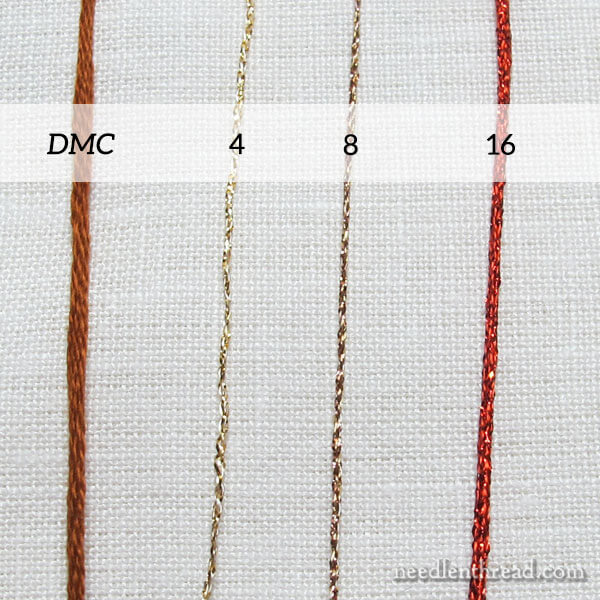
In the photo above, you can get a good idea of the size of three of Au Ver a Soie’s metallic braids.
On the left, for comparison’s sake, is a full strand (all six) of DMC cotton floss.
The next thread to the right is the metallic braid #4, which is the finest size. The #8 is about twice as heavy. And the #16 is about twice as heavy as the 8, and stitches up slightly heavier than the full six strands of DMC.
With these braids, it’s easy to stitch real embroidery stitches on closely woven fabric. They don’t crumble, crinkle, snaggle, tangle, knot, twist or break in the process, despite the fact that they’re traveling through closely-woven fabric repeatedly.
To demonstrate, I worked up a bit of stitching for you.
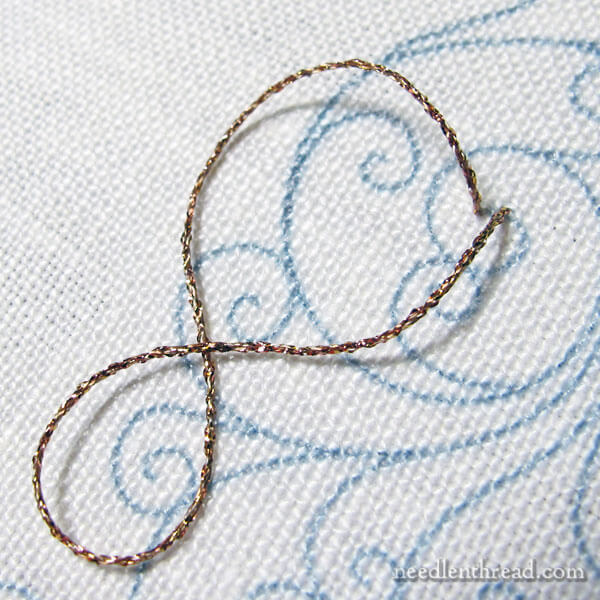
Using a reduced version of this scrolly design (it’s 3.5″ wide on the fabric), I stitched a few scrolls with the metallic braids.
I started with the #8.
Do you see how the braid has turned itself into a figure 8 in the photo above? That’s the one and only time the thread “twisted” while I stitched with it, and that was the extent of the twist. As I pulled the thread through, it straightened itself up and moved right through the fabric.
Sure, there’s a different feel and sound when metallics pass through the fabric. But with these braids, there was no hang up, no snarling as I stitched.
I used a stem stitch on this little demo piece…
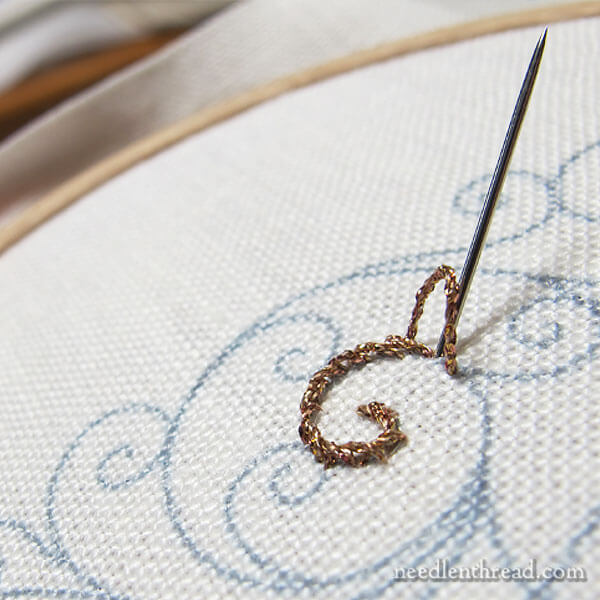
…which is not generally a metallic-thread-friendly stitch.
But it worked!
Notice that, on the fabric all around the stitching, you don’t see any metallic speckles or any remnants of slivers of thread that have broken off. You also don’t see any discoloration on the fabric around the stitches, which can happen with some metallic threads.
On the braid, you don’t see any significant spaces of separation between the metallic filaments, either, where the core thread shows through a lot. This often happens on metallic threads, either due to breakage or just shifting of the metallic filament.
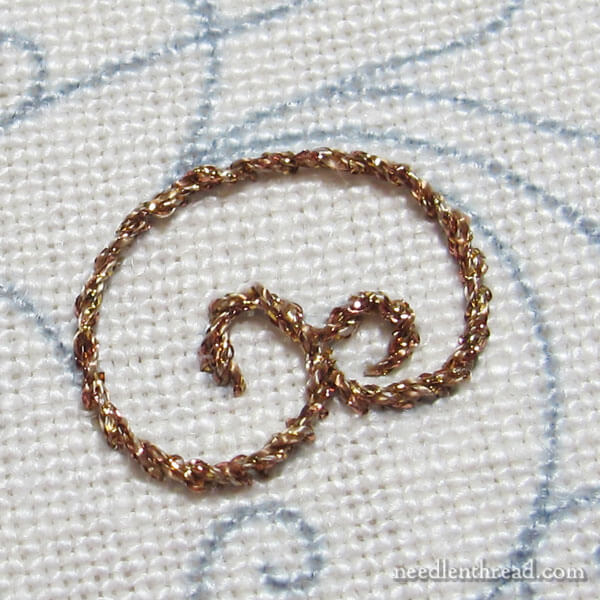
Why, hello there, little curlicue!
See? The thread survived!
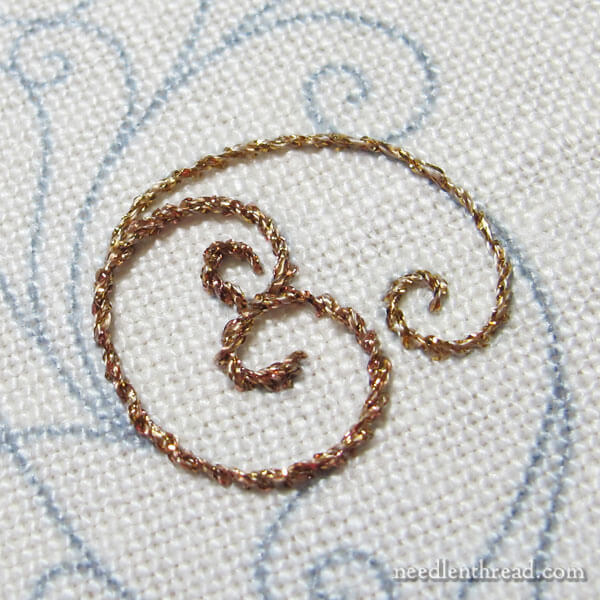
Next up, I worked a curl with the #4, which is the finest braid.
The #4 is not as “heavily” braided as the #8 – there isn’t as much metallic around the core as there is on the 8 – but it still holds up very well to stitching. Again, no twists, snags, breaks, knots…
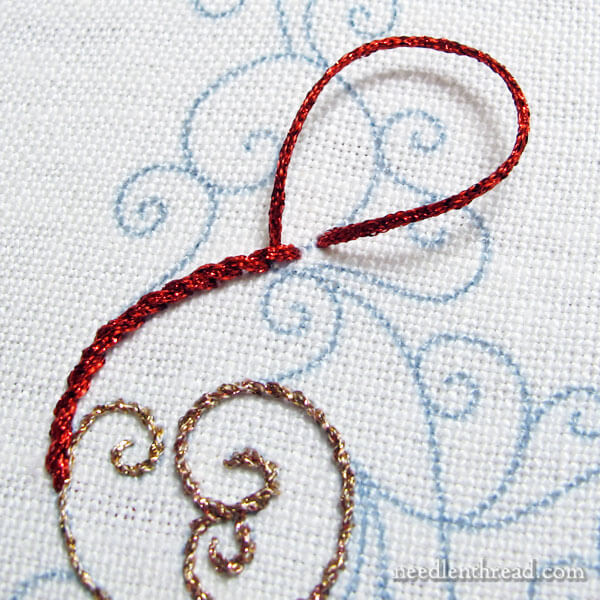
…and so I moved on to the #16, which is, in fact, a rather massive braid all things considered, and because of its size, I wasn’t expecting it to hold up well to stem stitch.
But guess what?
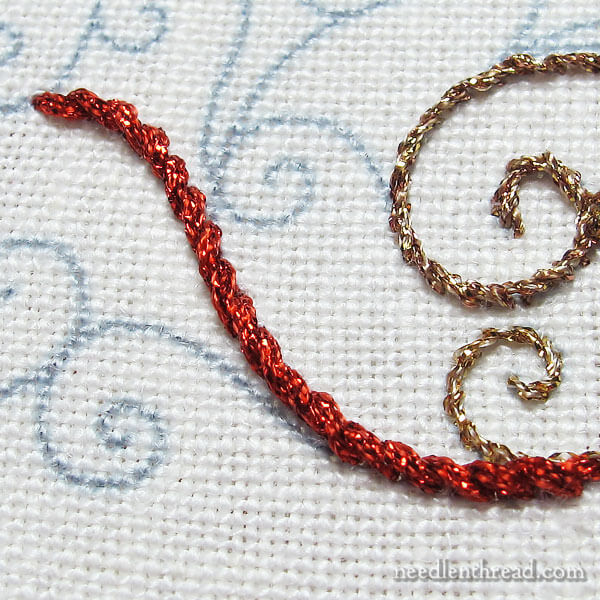
It not only held up, but it held up beautifully.
I didn’t encounter one moment of frustrated stitching, either. I just started stitching, stitched the stitches, and I stopped stitching, just like I would with any thread.
I didn’t use a laying tool. I didn’t use a thread conditioner. I didn’t iron the threads or run them through a flat iron. I didn’t do anything other than work through the steps of the stitches.
One of the frequent tips for working with metallics and reducing frustration is to work with very short lengths of thread. In some cases, I’ve heard of folks who advise 12″ or shorter. I’ve even come across kit instructions that say to cut 10″ lengths. Once they start showing wear or begin to break down, you should switch the thread.
With the Au Ver a Soie braid, I cut all of the braids at 18″ which is about the length I use for regular floss. I never had to stop stitching for breakage or signs of wear.
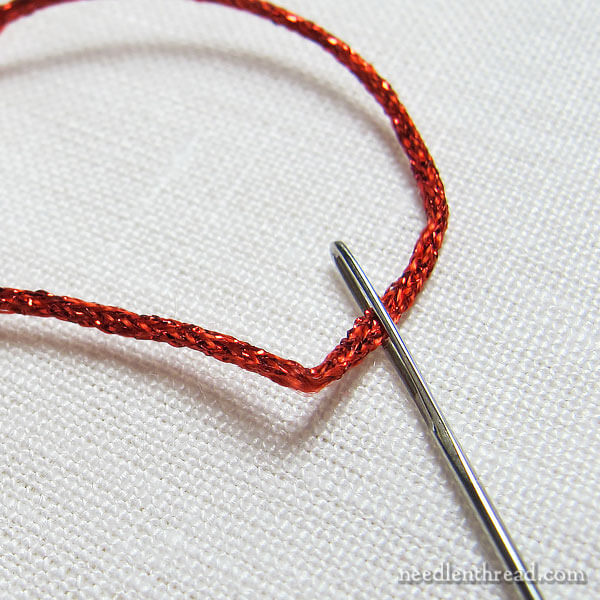
The telltale sign of metallic thread breakdown often starts at the eye of the needle. Here, you’ll normally find broken metallic filaments that catch and buckle as the thread passes through the fabric.
Above, you can see the #16 in the eye of the needle, and the crease where it was folded in the eye. Yes, there’s some wear – that’s expected with any thread – but notice that there’s no broken metallic filaments. No bunched metallic filaments. No little knotty bits.
What a champ of a thread!
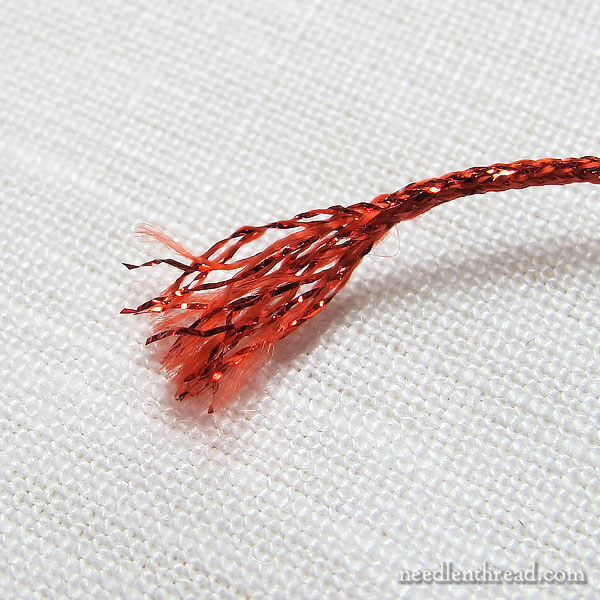
The short end of the thread by the eye fuzzed out a bit, as any thread will. But it’s still in great shape – nothing missing, knotted, kinked up or broken down.
Now, if every metallic thread behaved like these, I’d probably be in trouble. I’d probably have a hefty stash of metallics.
These are wonderful braids to work with! And if they work this well on closely-woven linen, imagine how comfortably they’d be to use on counted cross stitch fabric and needlepoint canvas!
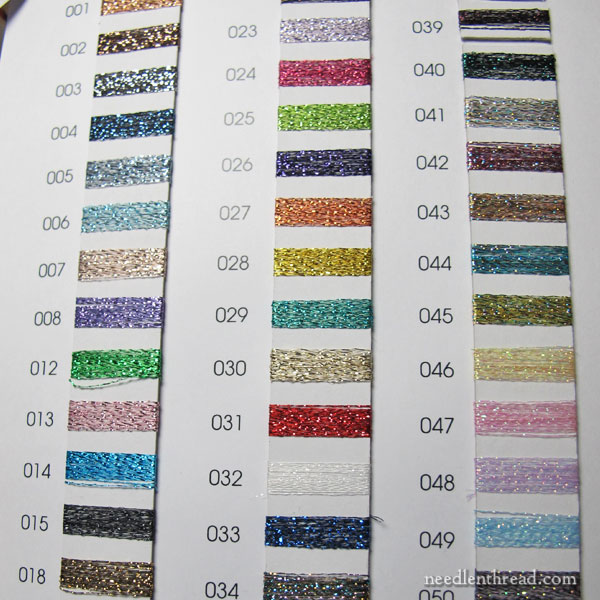
This is just one page of Au Ver a Soie’s color card for their metallics, showing the solid colors. With the project I have in mind, the dark blues, greens, and blue-greens that are somewhat reminiscent of a peacock are what I’m honing in on.
Not that I’m stitching a peacock, mind you! But gosh, now that I think about it…!
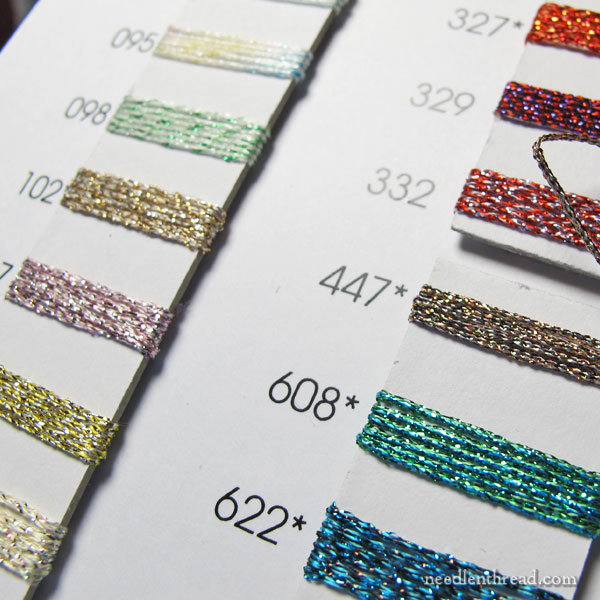
*Sigh.* The mixed colored braids are delectable!
Where to Find Them
One of the reasons I suppose folks in the US don’t work with Au Ver a Soie’s metallics more often is that… alas and alack!…up to now, they haven’t been widely available here in the States.
I can’t help thinking that perhaps the problem is that more stitchers don’t know about them. After all, if you knew that there are metallic threads that offer a much less frustrating stitching experience, with a wide range of colors in different weights…wouldn’t you want to use them?
I figure that, if you pour your heart and soul into your stitching, then you deserve beautiful and easy-to-use metallics.
You can find a few different collections of Au Ver a Soie metallic threads available here in my shop. This selection will expand slowly, but for now, you’ll find a holiday collection (perfect for ornaments and sparkly holiday stitching!), a gold collection, and a silver collection. The collections come with different weights of the metallics, so you can create fine to heavy metallic embroidery and accents.
These are surely the best metallic threads for surface embroidery on the market today. I’m convinced that, if you stitch with metallics, Au Ver a Soie’s braids will change your needlework game entirely!
I hope you try them!


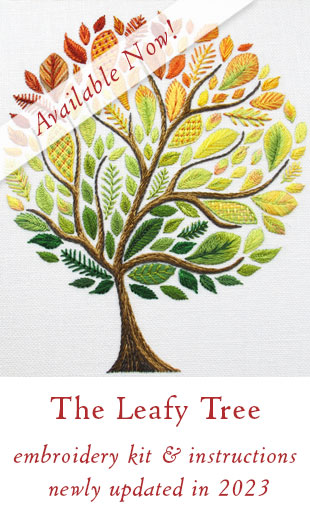
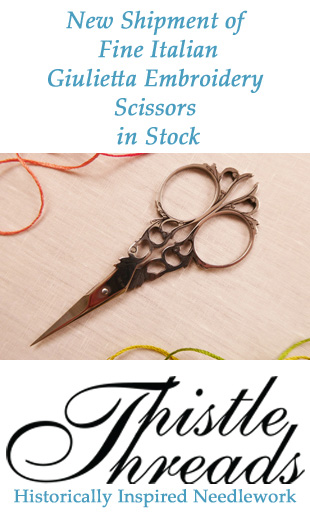
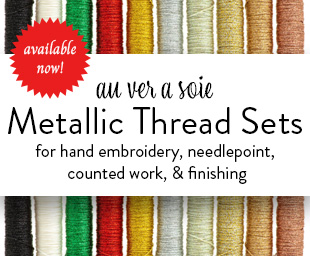
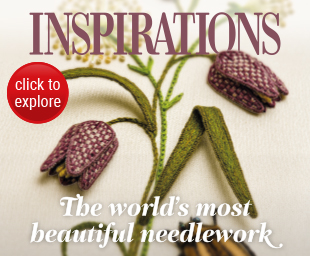
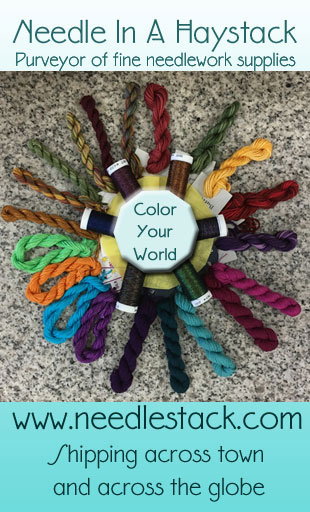
It sounds lovely but I really do not understand the frustration of working with metallics that people report all the time, I find stitching with both DMC metallics and Kreinik to be almost the same as working with normal cotton. I know that it unravels a bit at the end, and that is normal – especially for metallics but I think that in some cases people don’t realise it happens and get all upset when it does.
I don’t think twice about using metallics for anything, in fact if I can work out a way to add them that looks like it belongs I will!
As always ,Mary, your stitching is lovely but I’ll be dipped if your transferring isn’t spot on! I don’t see any bumps or oopses on the linen-that would be a good “How to” video.
Wendi
Thank you for the nice spotlight of these metallic threads. I have also heard people speak highly (and lovingly) of Cosmo Sparkle Floss, for adding a little oomph to cross stitch projects. I have a question about the relative size of the #4 and #8. I was wondering about how many strands of DMC floss the #4 and #8 would be equivalent to? It looks like, from the photo, the smaller braid would be about 2 strands of floss and so the #8 would be about 4 strands. Does that seems right to you? Thanks again!
I was wondering the same thing. Did you ever get an answer? I’ve been working on a quilt that incorporates hand embroidery. The instructions recommended Cosmo sparkle floss, which I purchased at the time I bought the pattern. That was a few years ago and I am just now getting to that project. Unfortunately, I ran out and Cosmo no longer makes that particular floss. In my search for something similar I discovered this article and the Au Ver a Soie is very similar, maybe even better, just not sure which size to purchase, the #4 or the #8
Hi, Linda – the 4 is the finer braid. The 8 is quite heavy, so I would imagine that it might be a bit much on a quilt, but I guess it depends on the design!
Wow! This is a fantastic bit of information. I adore sparkly threads and will use Kreinik (crunchy stuff), Petite Treasure Braid (pretty nice) and even resort to Edmar threads (for cross stitch?! Yes) to get some excitement in my work. But this is a stitcher’s dream. Thank you for letting us know.
Mary,
Thank you for this post! Excellent information.
Beth
Dear Mary
Great news that finally there is a metallic thread out there that is easy to use. Like you I don’t like working with metallics for the very reasons you point out above but Au Ver a Soie’s metallic thread look so easy to use. But there again I’m a great fan of all Au Ver a Soie’s thread especially Soie D’Alger which is my favourite silk thread to work with I love it. They have great colour selection, 150 thats as many as there are in the Soie D’Alger range. Thanks for sharing with us Au Ver a Soie’s metallic thread with us and for the photos above of the different strengths. I hope you have a great weekend.
Regards Anita Simmance
I’m interested in using the metallic threads, as I use Krinick quite a bit. What colors do you have? You can contact me via my email.
Thanks.
Hi, Dottie – I don’t do the actual retail sales. You might contact Needle in a Haystack, as they stock some of them right now. There’s a link at the end of the article to their page. They have silver and golds in stock, and I think an opalescent.
I was wondering about the color card. Is it available for purchase or are those photos from a web page? Do they have a color card available for their silk threads? Thanks!
That’s an actual color card that I have, which was from the folks at Au Ver a Soie. You might check their website, to see if they sell them?
That is just gorgeous! I just finished a quilt that had quite a lot of metallic embroidery and I used Cosmo brand. It worked well and I’d use it again if I couldn’t find the Au Ver a Soie. It doesn’t come in very many colors, though.
Another thing I found that helped was using a Quilter’s Binding Needle. Fons & Porter markets them and the needles did a great job. They have a very sharp point and a rather large eye that didn’t fray the floss at all.
I was dreading the metallic embroidery part and waited until the very last thing to do it. But it went very smoothly.
Can you wash them?
Hi, Holly – well, I’ve rinsed projects with them on, to no bad effect, but I don’t know that I’d actually launder with them on. Not sure – something to test!
Thanks for the article! I love metallics but don’t use them in my surface work because of the problems you talked about. This changes everything!!! Thanks for enabling!
Mary,
I’ve used a lot of Kreinik threads, especially for canvas work – typically #8 and #12 on 18ct mono canvas. They’ve worked will for me. What’s intriguing me is that the color cards you show look like they line up directly with the Kreinik numbering. Ex: 332-candy cane; 622=Wedgewood blue. Doesn’t feel accidental.
Have you tried Rainbow Gallery’s Silk Lame’? silk and metallic, already combined. Petite Silk Lame’ is roughly perle cotton #5 weight so it works well on 18 ct canvas. One of my favorite threads.
Mary, thank you as always for terrific information and guidance. Can you tell me what type and size needle you were working with using a #8 metallic as shown in your photo? I’m working with a metallic that came in a kit and it’s horrific! Can’t get it into a needle and when I do, the needle is too big and makes a huge hole in the fabric so I’m thinking of scrapping it and buying the #8 Au Ver a Soie to replace it. Thanks.
The metallic threads have been available for years here in the USA at any well stocked needlework shop as well as JoAnn’s, Michaels Crafts, and Hobby Lobby. They are sold under the Kreinik name and are the Au Ver a Soie metallic.
I’ve been tatting with the size 4 braid for years, it makes gorgeous little snowflakes and confetti.
I don’t think they are the same. I’m embroidering with Kreinik now and I can easily see that they are not constructed the same as what Mary has so kindly shown us. My Kreinik is chain stitched braid and the one above is a woven braid. I’ve stitched with the DMC metallic and hate it. The metallic filament is wrapped around the core and easily shifts to expose the core. The Kreinik braid handles better and exposes its core much less, but can be twisty.
I don’t find metallics to b a problem at all! Simplest way to use them on linen, etc., is to take one strand, fuzz the end, and pull out one or two of the metallic strands to use for couching thread. Then just couch them! The couching thread matches perfectly, and works a champ if you are a bit careful. No wear, bunching, etc – just a lovely curved line in whatever weight you want to use. There are a lot of metallic strands in the thread – plenty of matching couching thread. I keep the unused piece of thread I’ve pulled metallics from with the other whole strands – ready for next time. You will need to use shorter lengths of the pulled metallic strands.
Want a thicker line? Just use a heavier weight thread.
I’m thinking hummingbirds!
Boy oh boy, do I wish you’d written this article about three months ago. I finally broke down and invested in about two dozen Krenik and one dozen Sulky metallic threads. I want to add sparkle to cross stitch Christmas cards. My main problem with the Krenik is the metallic breaks away from the core thread. Then I have a nasty tangle to unravel. (BTW, your articles on 12/1 and 12/3/08 were my inspiration. I also purchased Merry Christmas Embroidery on Paper) As per usual, purchasing the materials is the easy part. Now I need to buckle down and get sewing.
Mary, are you using a frame or a hoop to do this? Makes me want to abandon cleaning and start stitching!
Mary, I’ve been using Kreinik Metallic threads for over 20 years. (I think these are the same threads you just reviewed). Barbara Meger at Classiccreationssmocking.com carries a large assortment of sizes and colors. I have bought from her website as well as from her in person at smocking conventions. She is one of my favorite smocking teachers.
Has anyone had any luck buying these in Australia?
Mary, you’re a champ! I’ve been planning a new smocking project and I wanted to come use metallic thread on. But metallic thread frustration had me hesitating. Not any more! Thanks for the great review!
I have been dinking around on my computer trying to locate these Au Ver a Soie metallics. The one company in the US that supposedly carried all of the threads, Wyndham Needleworks, has gone out of business.
I did, however, find a metallic thread called Accentuate. One of the sites where I located it said the “publisher” is Au Ver a Soie – I’m not sure if that means the manufacturer or not. ABC Stitch Therapy has a lot, if not all, of the colors.
Hi, Donna – Accentuate is a much finer thread. I’ve used it for some applications (in fact, I sued it for some shisha work, using a blue to hold the mirror on, and it gave it a nice, icy look). But it’s not nearly as heavy as the braids. Still, it works great!
Hi, Donna,
Wyndham Needleworks has indeed closed their shop. However, they are now selling their remaining stock through ebay, under the identity wyndham5. Since closing the shop they have become involved with an animal shelter, and the proceeds benefit the shelter. New auction postings usually go up at the end of the week. There are other postings that are not auctions. Full disclosure: I’ve bought a few items; transactions were handled well.
Thanks so much for this wonderful information! Just one problem… now I want as many varieties of this thread as possible. So, I’ll try to be reasonable & cook up a specific project to use them in first!
Dear Mary, Well, I just had to chuckle when I read Needle in a Haystack’s webpage note that they have sold out of those beguilingly, bewitching and easy to use metallic threads. And all because you told us about how good they are. If anyone needs proof that we trust what you write about then this must be one of the best examples!!
Your post comes just when I finished a projet using Au Ver a Soie’s metallic braids size #8 and DMC’s Diamant metallic thread. Both were fine to work with.
I used quite long thread for the design I needed to embroider and none of them were damaged. I use a slip knot which helps to keep the braid undamaged.
I was told that Kreinik threads are exactly the same as Au Ver à Soie. They copy them before Au Ver à Soie filed a patent.
I am a long time sufferer of MTD, I will have to try these threads and see if they will cure it!
Hi Mary, Just put the new 20 colors of #4 on the site and will have the #8 and #16 up tomorrow !
Hello!
Thank you for all the info regarding what looks to be an amazing metallic thread. One question: do you think it can be used on hand embroidered garments? Will it hold itself during washing process. Have you tried washing it?
Thanks!
I have washed it and it’s fine, but I haven’t laundered it repeatedly. I hand washed a piece with it once, and it held up just great. If you’re planning on laundering it after using on clothing, I’d probably do a little test piece first and launder the piece in the same way you plan to launder the clothing. Then you’ll know for sure!
Thank you, Mary! They are incredible indeed!
So thankful for your info. I have postpone working on a project because I hated working with metallics.
I would definitely try this thread. I love embroidery projects.
Hi. Great article, thank you. Have you ever used the Gütermann metallic threads? I’ve just bought a crewelwork kit and it comes with the Gütermann, but I’m wondering if it’s worth buying the Au Ver a Soie thread to use instead.
I have used it. I prefer Au Ver a Soie. I’ve just had better luck with it all around, when it comes to any kind of surface embroidery. But give the Gutermann a try – you might like it! It doesn’t hurt to test stitch a small bit, to see if it will work fine for you before investing in another type of thread.
Thanks for sharing this information, I will definitely try this thread.
Thank you so much for the article! This is just what I have been on the hunt for! I will be placing an order soon! I appreciate your research!
Please put me on a mailing list for future reference.
It looks like I will have to come back another time to buy a Shaded Metallic bundle. They look beautiful. Do you use a special Metallic Needle, or just a needle with a larger eye? What size/type needle are you using for your different size threads? Also, do you have any idea when your next shipment might be in?
Thank you,
Rebeccca McNutt
Hi, Rebecca, I have some coming in within the next 1 – 1.5 weeks – a restock on the shaded gold and a new addition of a green shaded set. The other colors will be here as soon as they can be!
You can drop me a line at mary (at) needlenthread (dot) com to request an email notification when the threads are restocked.
I do plan to have some of the gold and silver ensemble sets (various sizes and types) available again shortly, as well as the holiday sets.
I’d like to know if these A Ver a Soie threads can be nicely used in tatting or not? Has anyone told you if they did; and if so, how did this brand of thread work out for them? I am interested due to the wide array of metallic shades…
Thank you for your information you can provide!
Yours hopefully in tatting thread possibilities, Alissa Pesavento (from PA)
I have not tried them for tatting, but perhaps someone else has and will chime in with an answer. It might be worth purchasing a spool or two and trying it – you might be the first who’s ever attempted it, so …! Well, I figure it never hurts to try! At least you could troubleshoot it all and see what can be done with the threads, as far as similar techniques are concerned.
Thank you for your information on the metallic and you demonstrations.
Wonderful
How do I order the metallic threads from you.
Regards
Rosina Brisbane Qld Australia